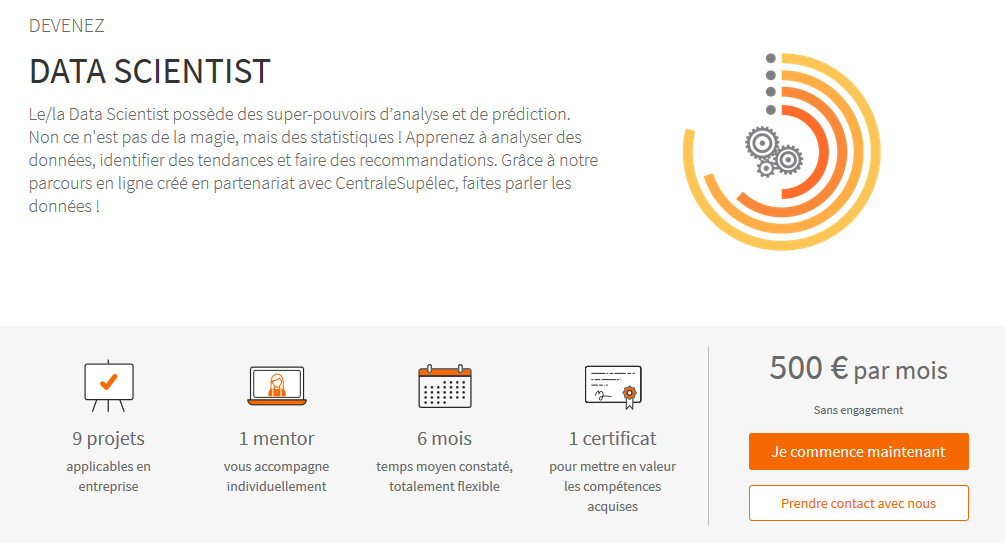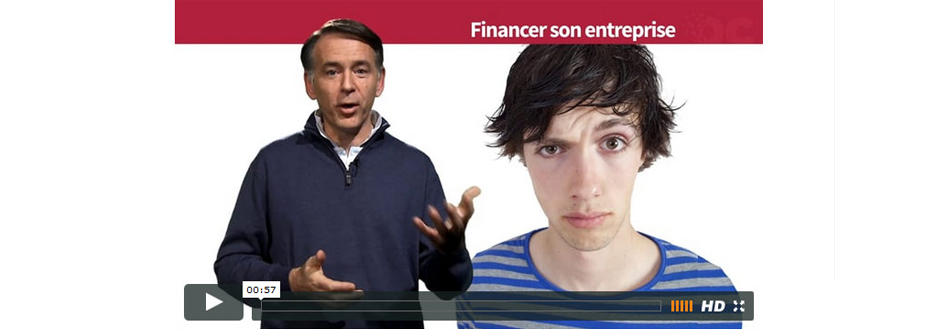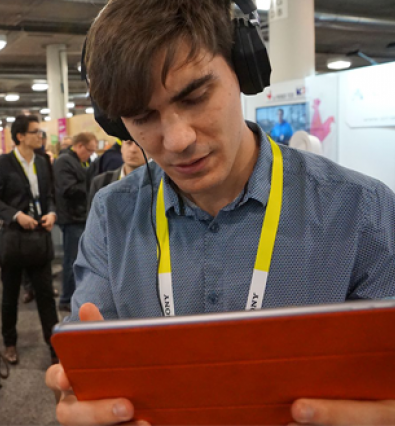MOOC : cours en ligne ouvert à tous
Dès 2014, CentraleSupélec a été l’une des premières institutions d’Enseignement Supérieur à être reconnue pour ses innovations pédagogiques. L’École participe activement à l’émergence de l'éducation en ligne en France à travers une large politique digitale et fut parmi les 3 premiers établissements français à être sélectionnés pour proposer des Massive Open Online Courses (MOOC) sur Coursera.
Coursera est la première plateforme de formation en ligne proposant des MOOCs, ayant constitué des partenariats avec les plus grandes universités et organisations du monde, pour proposer des cours en ligne accessibles à tous.
C’est donc dans cette dynamique que CentraleSupélec a proposé dès janvier 2014 les MOOCs « Discrete Inference and Learning in Artificial Vision » de Nikos Paragios & Pawan Kumar, ainsi que « An Introduction to Functional Analysis » avec John Cagnol. L’école propose aujourd’hui 3 MOOCs sur Coursera et 1 MOOC sur OpenClassrooms, et a fédéré en moins de 3 ans plus de 313 000 participants sur la totalité de son offre de cours en ligne.
Rendre des cours accessibles gratuitement partout dans le monde répond à la volonté de CentraleSupélec de donner un accès à des formations d’excellence à tout individu doté d’une connexion internet.
Focus sur les métiers de la Data
Depuis 2017, l'Ecole propose également avec un nouveau partenaire, OpenClassRoom, 3 parcours en ligne certifiant dans le domaine de la data science :

Focus sur "Build Your First Android App"
What you’ll achieve
In this project-centered course*, you’ll design, build, and distribute your own unique application for the Android mobile platform. We’ll provide you with a set of customizable building blocks that you can assemble to create many different types of apps, and that will help you become familiar with many important specificities of Android development. When you complete the project, in addition to having a personalized app that you can use and share, you’ll have the skills and background you need to move on to more advanced coursework in Android development.
What you’ll need to get started
This project-centered course is designed for learners who have some prior experience programming in Java, such as an introductory college course or Coursera’s Java Programming Specialization (https://www.coursera.org/specializations/java-programming). You will need a computer with a stable Internet connection, but you will not need an Android phone - we’ll use free software that you can use to emulate a phone on your computer. We'll use Android Studio as IDE; it is compatible with most computer and operating systems.
You can find detailed system requirements here
*About Project-Centered Courses: Project-centered courses are designed to help you complete a personally meaningful realworld project, with your instructor and a community of learners with similar goals providing guidance and suggestions along the way. By actively applying new concepts as you learn, you’ll master the course content more efficiently; you’ll also get a head start on using the skills you gain to make positive changes in your life and career. When you complete the course, you’ll have a finished project that you’ll be proud to use and share.
Build Your First Android App (Project-Centered Course)
Dr. Virginie Galtier, Associate Professor, Computer Science
Michel Lanotto, Associate Professor, Computer Science
Time: 10 hours of study, 10 hours of active project work
Focus sur "On Strategy: What Managers Can Learn from Philosophy - PART 1"
À propos de ce cours :In the expression “creative thinking”, the keyword is not creativity; the keyword is thinking. With the help of great philosophers, you will rediscover the art of thinking. To help leaders to be rigorous even without figures, great philosophers have lots of ideas. Managers are invited to rediscover the art of thinking. They should understand the role of mental models, realize the importance of cognitive bias, agree on clear definitions and efficient criteria etc.
Creativity demands the ability to unshackle ourselves from conventional ways of thinking, to "think outside the box". But we need to go a step further. Once outside the box, we need to construct a new box or boxes (that is, new intellectual frameworks or models) to help us structure our thinking. Only once we have done so can we generate truly game-changing ideas.
Luc de Brabandere, professor at CentraleSupélec

Focus sur : "Two Speed IT: How Companies Can Surf the Digital Wave, a BCG Perspective"
Transform or disappear, the Darwinism of IT: In order to adapt to a digital world, a two-speed IT is needed. Despite the importance of IT in today’s digital world, Chief Information Officers (CIOs) often struggle to get their voices heard by executive committees. Faced with this challenge, IT departments are being forced to reinvent themselves to adapt their companies to the fast paced evolution of technology. The Boston Consulting Group has developed a business approach that allows IT to shed off its appearance of a heavy cost center and to adopt a new, more realistic persona as a quality service provider, partnering with users and the management.
Would you be a professional, a student in engineering, a student in a business schools or would you just be interested in digital transformation and its implications on IT, Learn with three BCG experts why and how to manage an IT department as a business in order to transform a company and adapt it to a digital world.
Two Speed IT: How Companies Can Surf the Digital Wave, a BCG Perspective
Antoine Gourévitch, Senior Partner and Managing Director at The Boston Consulting Group
Vanessa Lyon, Partner and Managing Director at The Boston Consulting Group
Eric Baudson, Managing Director at The Boston Consulting Group

Focus sur : "Financer son entreprise"
Ce n'est un secret pour personne : toute entreprise a besoin d'argent pour fonctionner. Mais, quand on se prépare à lancer sa propre entreprise, concrètement, comment fait-on ? Lorsqu'on souhaite faire une levée de fonds auprès de business angels ou de capitaux risqueurs, qu'est-ce que cela implique ? Etes-vous sûr de vouloir travailler avec des business angels ou des capitaux risqueurs ? Et eux-mêmes d'ailleurs, à quoi pensent-ils lorsqu'ils font une levée de fonds ?
Ce cours va vous présenter le processus de la levée de fonds et les relations qui s'établissent avec les business angels et capitaux risqueurs.
Cours à accès payant

Focus sur "Développement durable"
L'ambition du cours, dirigé par le professeur Pascal Da Costa, est de confronter ses participants aux enjeux techniques, économiques, sociaux et environnementaux du XXIe siècle. Ces enjeux sont par nature très fortement couplés et complexes. Ils exigent une approche interdisciplinaire, afin d’adopter un vrai questionnement, au delà des préjugés et des idées reçues. C’est pourquoi des spécialistes reconnus dans les domaines de l’économie, de la démographie, de l’énergie, du climat, de l’eau et de l’agriculture, et issus des meilleurs institutions et centres de recherche français (CentraleSupélec, INED, Cnam, CEA, AgroParisTech), interviendront avec la volonté de confronter leurs points de vue et de débattre avec vous. La démarche générale du cours consistera à examiner les enjeux du développement durable au regard d’études scientifiques rigoureuses et récentes, pour :
-
donner et discuter des chiffres clés (de l’état des lieux aux futurs possibles)
-
comprendre la construction de ces chiffres (hypothèses et limites des modèles scientifiques sur lesquels ils reposent)
-
et aborder l’ensemble des enjeux dans leurs différentes dimensions (notamment de l’échelle locale à l’échelle mondiale).






